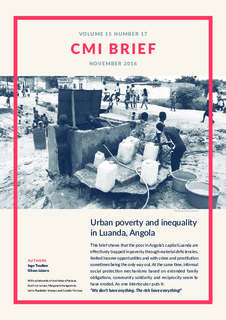| dc.contributor.author | Tvedten, Inge | |
| dc.contributor.author | Lázaro, Gilson | |
| dc.date.accessioned | 2018-01-04T08:21:18Z | |
| dc.date.available | 2018-01-04T08:21:18Z | |
| dc.date.issued | 2016-11-01 | |
| dc.identifier | oai:www.cmi.no:6022 | |
| dc.identifier.citation | Bergen: Chr. Michelsen Institute (CMI Brief vol. 15 no. 17) 4 p. | |
| dc.identifier.issn | 0809-6732 | |
| dc.identifier.uri | http://hdl.handle.net/11250/2475194 | |
| dc.description.abstract | This brief shows that the poor in Angola’s capital Luanda are effectively trapped in poverty through material deficiencies, limited income opportunities and with crime and prostitution sometimes being the only way out. At the same time, informal social protection mechanisms based on extended family obligations, community solidarity and reciprocity seem to have eroded. As one interlocutor puts it:
“We don’t have anything. The rich have everything!” | |
| dc.language.iso | eng | |
| dc.publisher | Chr. Michelsen Institute | |
| dc.relation | CMI Brief | |
| dc.relation | 17 | |
| dc.relation.ispartof | CMI Brief | |
| dc.relation.ispartofseries | CMI Brief vol. 15 no. 17 | |
| dc.relation.uri | https://www.cmi.no/publications/6022-urban-poverty-and-inequality-in-luanda-angola | |
| dc.subject | Inequality | |
| dc.subject | Angola | |
| dc.subject | Luanda | |
| dc.title | Urban poverty and inequality in Luanda, Angola | |
| dc.type | Report | |
